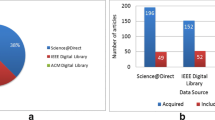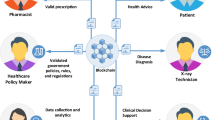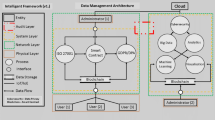Abstract
Although a mechanism for trust in agricultural product transactions has systems and laws to endorse contracts, the credit relationship and security mechanism lack sufficient trust. Currently, an RFID traceability system is used to solve the problem that how to read and protect data, but the situation is such that the data can be tampered with, thus considerably lowering security. Blockchain technology, which is a distributed, shared, and encrypted database, however, can be used for such security. Through distributed accounting, a decentralized credit system can be established to enhance data security, which is a new mode to save time and costs. In this paper, the problems of the food supply chain system are systematically reanalyzed in the framework of traditional food supply chain systems. In addition, after analyzing the characteristics of blockchain technology, a decentralized credit mechanism for the food supply chain is proposed. The traceability of agricultural products based on the blockchain can realize fast and secure authentication permissions and achieve data security in which data cannot be tampered with or forged from anti-counterfeiting, and information privacy is protected.


Similar content being viewed by others
References
Chen, X., & Kwan, M.-P. (2017). Contextual uncertainties, human mobility, and perceived food environment: The uncertain geographic context problem in food access research. American Journal of Public Health., 105(9), 1734–1737.
Johnson-Hall, T. D. (2017). Ensuring food safety by preventing food recalls: The impact of locus of failure, regulatory agency discovery, breadth, and firm size on corrective action. Journal of Marketing Channels, 24(3/4), 115–135.
Koufteros, X., & Lu, G. (2017). Food supply chain safety and security: A concern of global importance. Journal of Marketing Channels, 24(3/4), 111–114.
Lu, G., & Koufteros, X. (2017). Toward a taxonomy of food supply chain security practices. Journal of Marketing Channels., 24(3/4), 190–203.
Abiyev, R. H., Uyar, K., Ilhan, U., Imanov, E., & Abiyeva, E. (2018). Estimation of food security risk level using Z-number-based fuzzy system. Journal of Food Quality, 2018, 1–9.
Allen, T., Prosperi, P., Cogill, B., Padilla, M., & Peri, I. (2019). A Delphi approach to develop sustainable food system metrics. Social Indicators Research, 141(3), 1307–1339.
Navarrete RAM, Esteban L, Cruz F.Brazilian (2016). Security of the internet of things: Perspectives and challenges. Journal Wireless Networks archive, 20(8), 2481–2501.
Kasten, J. (2016). Blockchain application: The dairy supply chain. Journal of Supply Chain Management Systems., 8(1), 45–54.
Drosatos, G., & Kaldoudi, E. (2019). Blockchain applications in the biomedical domain: A scoping review. Computational and Structural Biotechnology Journal, 17(2019), 229–240.
Kamble, S. S., Gunasekaran, A., & Gawankar, S. A. (2020). Achieving sustainable performance in a data-driven agriculture supply chain: A review for research and applications. International Journal of Production Economics, 219, 179–194.
Krzyzanowski, K. (2019). Putting food on the blockchain: A regulatory overview. Journal of Food Distribution Research., 50(1), 86.
Kim, H. M., & Laskowski, M. (2015). Toward an ontology-driven blockchain design for supply-chain provenance. Intelligent Systems in Accounting, Finance & Management, 25(1), 18–27.
Zhao, G., Liu, S., Lopez, C., Lu, H., Elgueta, S., Chen, H., & Boshkoska, B. M. (2019). Blockchain technology in agri-food value chain management: A synthesis of applications, challenges and future research directions. Computers in Industry, 109, 83–99.
Kittipanya-ngam, P., & Tan, K. H. (2020). A framework for food supply chain digitalization: lessons from Thailand. Production Planning & Control., 31(2/3), 158–172.
Khan, P. W., & Byun, Y. C. (2020). Park N (2020) IoT-Blockchain enabled optimized provenance system for food industry 4.0 using advanced deep learning. Sensors, 20(10), 2990.
Feng, H., Wang, X., Duan, Y., Zhang, J., & Xiaoshuan, Z. (2020). Applying blockchain technology to improve agri-food traceability: A review of development methods, benefits and challenges. Journal of Cleaner Production., 260, 121031. https://doi.org/10.1016/j.jclepro.2020.121031
Bumblauskas, D., Mann, A., Dugan, B., & Rittmer, J. (2019). A blockchain use case in food distribution: Do you know where your food has been? International Journal of Information Management. https://doi.org/10.1016/j.ijinfomgt.2019.09.004
Muzammal, M., Qu, Q., & Nasrulin, B. (2019). Renovating blockchain with distributed databases: An open source system. Future Generation Computer Systems., 90, 105–117. https://doi.org/10.1016/j.future.2018.07.042
George, R., Harsh, H. O., Ray, P., & Babu, A. (2019). Food quality traceability prototype for restaurants using blockchain and food quality data index. Journal of Cleaner Production., 240, 118021. https://doi.org/10.1016/j.jclepro.2019.118021
Rogerson, M., & Parry, G. C. (2020). Blockchain: case studies in food supply chain visibility. Supply Chain Management, 25(5), 601–614. https://doi.org/10.1108/SCM-08-2019-0300
Hew, J. J., Wong, L. W., Tan, G. W. H., Ooi, K. B., & Lin, B. (2020). The blockchain-based Halal traceability systems: a hype or reality? Supply Chain Management, 25(6), 863–879. https://doi.org/10.1108/SCM-01-2020-0044
Rejeb, A., Keogh, J., Zailani, S., Treiblmaier, H., & Rejeb, K. (2020). Blockchain technology in the food industry: A review of potentials challenges and future research directions. Logistics. https://doi.org/10.3390/logistics4040027
Kouhizadeh, M., Saberi, S., & Sarkis, J. (2020). Blockchain technology and the sustainable supply chain: Theoretically exploring adoption barriers. International Journal of Production Economics., 231, 107831. https://doi.org/10.1016/j.ijpe.2020.107831
Acknowledgements
This research is supported by Grant-in-Aid for scientific Research of the Japanese ministry of Education, Culture, Sports, Science and Technology under the Contract No.(C) 19K01824 (2019–2021).
Author information
Authors and Affiliations
Corresponding author
Additional information
Publisher's Note
Springer Nature remains neutral with regard to jurisdictional claims in published maps and institutional affiliations.
Rights and permissions
About this article
Cite this article
Cui, Y., Idota, H. & Ota, M. Rebuilding the Food Supply Chain by Introducing a Decentralized Credit Mechanism. Rev Socionetwork Strat 15, 239–250 (2021). https://doi.org/10.1007/s12626-021-00079-4
Received:
Accepted:
Published:
Issue Date:
DOI: https://doi.org/10.1007/s12626-021-00079-4




